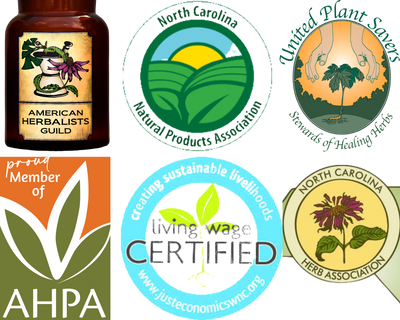The Brain Boosting Benefits of Lion's Mane Mushroom
Exploring the temperate rainforests of western North Carolina on a misty, damp weekday morning, a blotch of white in the midst of swaths of dark grey tree bark captures my attention out of the periphery of my vision. Closing in on it, foraging backpack in hand, I see that my eyes aren't playing tricks on me this time and turning an unsuspecting leaf or a gap in the woods into a mushroom - forager's goggles, they say. Looking like a clump of stalactites lost from its cave, the oblong shape I'm drawn towards glows in the shady glen. The milky white growth protruding from the side of the white oak is, in fact, what I think it is: lion's mane (Hericium erinaceus).
Approaching the mushroom, I notice how closely it resembles a part of an underwater seascape that's meandered into the woodland ecosystem, out of place from its coral reef. Lion's mane mushroom appears to be a dense cloud of toothed ivory spines, sharp and skinny. True to its name, every spike of the fruiting body could be a thick strand of an albino lion's ruff.
Hedgehog mushroom, monkey's head, pom-pom mushroom, bearded tooth - all of these other monikers for it make sense upon visual inspection of its explosion from the tree's side.
As I reach out and touch it, I am no longer fooled about whether it has sea urchin identities: it feels and smells like a mushroom, dense and rubbery to the hands, earthy and pungent to the nose.

Where Does Lion's Mane Grow?
Hardwood trees like oak, walnut, maple, birch, and beech provide the ideal home environment from which lion's mane mycelium can fruit. While it still grows wild here in the Appalachian mountains, lion's mane can be fairly easily cultivated from the white strands of its mycelium, a method which is preferable considering diminishing habitats and environmental concerns like deforestation. Conscious consumers must be sure to source lion's mane from ethically wildcrafted or sustainably and organically cultivated sources that have a reputation for integrity.
Benefits of Lion's Mane Mushroom
So what's all the hype about lion's mane mushroom? Why did I get so excited upon discovering it bursting from the oak's gut on my morning walk? Is this simply the latest in the parade of super-fungi or is it all its cracked up to be, plus some? Put your thinking caps on (and take your Brain Boost or your lion's mane extract - hint, hint at what body systems it supports) and let's review what we know about this fantastic fungus.
This article will focus on the efficacy of lion's mane in three areas: the brain, the mood, and the immune system. But rather than pigeon-holing this mushroom into "that brain herb", we will briefly explore its other benefits, too. No herb acts in a vacuum, and the reality is that this multi-tasking mushroom influences many other body systems beyond the brain. Lion's mane is also prized for its ability to support hormonal health, inspire cellular and nerve growth, and support optimal liver health.

Lion's Mane for the Brain
If lion's mane had a 1960s advertising jingle written about it, it would go: "Need to beef up the brain? Consume lion's mane!" If this sing-song helps you remember what to do with this herb, fantastic. If you'd rather be briefed on what the studies have to say, read on.
Delving into the early research on lion's mane -and of course there remains so much to be expanded upon in this department - we learn that lion's mane lives up to its reputation as 'the smart mushroom'. Possessing a rich bank of antioxidants and polysaccharides in each fruiting body, lion's mane may rescue and restore the brain suffering from damage or deficiency.
The two areas of the brain that lion's mane provides the most support for are cognition and memory. Lion's mane is thought to support mental clarity and dispel brain fog, whether it comes as a result of postpartum hormonal changes, natural processes of aging, or after a traumatic event.
Lion's mane mushroom is well established as a booster of overall brain and nervous system health through its ability to regenerate nerves and improve nerve growth, even after enduring trauma or events that have affected brain function and cognitive or nervous system health.
Lion's mane staves off brain drain. It increases capacity for a well-oiled memory machine and creating expansion and spaciousness in the face of shut down or dimming of the old lucid lightbulb.
Lion's mane has well-documented neuroprotective and neuroregenerative qualities that give it its reputation for potentially protecting the brain from stress, damage, and decline and maintaining a sharp mental state. Lion's mane is generally recognized as helpful for those of all ages and stages, though it has a particular affinity for those in their wisdom years who want to maintain and improve healthy cognition.
Cognition of the elderly may improve when lion's mane mushroom is incorporated into their daily consumption. Taken regularly on a daily and long-term basis, lion's mane is believed to interrupt a path of cognitive decline while simultaneously sharpening the thought and memory centers of the brain.
Mood Support and Lion's Mane
Through its mechanism of action on neurotransmitters and cognitive function, lion's mane has much to offer in terms of promoting a stable, happy, and balanced state of mind. Mental health is everything, especially when you find yourself in the midst of a mental challenge such as feelings of "the blues", the inability to think with clarity, or simply struggling with feelings of low energy or haziness. When you have support in your ability to think clearly, remember, and use critical thought, happiness, balance, and a sense of general well-being can follow.
This is where lion's mane comes in. Sought after for its ability to help maintain a sunny disposition, lion's mane gives a leg up to the individual who finds themselves in the mental trenches and is looking for a well-researched natural solution. Lion's mane makes an excellent addition to a full-fledged mood supportive herbal regimen, which might include St. John's wort, motherwort, and lemon balm (or a high quality blend of these like Sunny Days), along with lion's mane.
Fully aware, alert, alive, adept, and adaptable - these are all words that can be used to pinpoint the sensations that lion's mane offers those who use the extract daily.

The Immune System and Lion's Mane
Lion's mane supports sound brain and body function by supporting and stimulating the immune system, as well as the brain and nervous systems. A well-known immunomodulator, lion's mane helps to support and maintain a balanced, nourished system of defense and offense in the face of immune challenges throughout the seasons.
Lion's mane is known, like many beneficial mushrooms including chaga, turkey tail, and reishi, as an adaptogen. This means that its constituents assist the body non-specifically in adapting to the stressors of life in a healthy way. Systemically helping to modulate the immune and nervous systems via neurotransmitters, hormones, and cellular health, lion's mane normalizes and supports every organ system. Simply put, lion's mane is an adaptogen that helps your body to be its best self and live its best life - in as stress-free a way as possible.
Lion's Mane as an Edible Mushroom
While lion's mane is best known as a mushroom hosting a wealth of body and brain benefits, it also shows up on gourmet dinner plates and in lucky forager's feasts. Tender and delicious with that signature 'umami' flavor which is uniquely mushroom-y, lion's mane is a spectacular treat for the adventurous tastebuds when cooked.
The few times that I've been fortunate enough to enjoy a few buttery, salty shards of shaggy lion's mane on my plate have been some of the best meals of my life. If you're lucky enough to have fresh lion's mane be a part of your next wild foods dinner, be sure to accurately identify it (with the help of a seasoned mycologist), harvest it while keeping the precious mycelium intact, and cook it lightly with organic butter, coconut oil, or olive oil.
Lion's Mane Dual Extract
No other mushroom has near the neurological effects of lion's mane. The preferred method of assimilating all the benefits of lion's mane mushroom - and also the most convenient - is a dual extract.
Why dual extract mushrooms? A dual extract synergizes a rainbow of beneficial compounds, including beta-glucans and tritrepenes. We prize quality and sustainability and are proud to offer lion's mane on its own as a potent dual extract made using our special double extraction process.
We organically cultivate our lion's mane, which is harvested by hand during the seasons of its peak freshness and potency. The extract is made by double extracting the mushroom in both water and alcohol to concentrate both the water and alcohol soluble constituents of this valuable fungus.
Want to learn more? Check out our IG video on lion's mane.
Looking for an even broader spectrum of mushroom benefits? Our beloved Mushroom Elixir is a great alternative to a simple lion's mane extract, synergizing beneficial mushrooms reishi, maitake, chaga, and turkey tail together to bring the power of the fungus among us to you.







Comments
charlene ozell said:
the lions mane video won’t come up when I click on it.